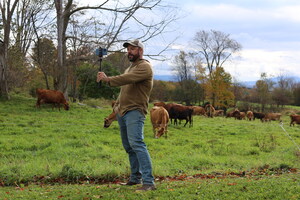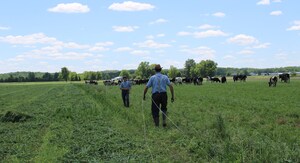LA FARGE, Wis., March 24, 2017 /PRNewswire/ -- "Fear less, cooperate more." It's a missive from Organic Valley CEO George Siemon, and it's been taken to heart. In its annual rite, more than 450 farmers from across the nation converged on La Crosse, Wisconsin this week for Organic Valley's annual meeting. Over the past year, the nation's largest organic cooperative has grown to 2,013 farmer-owners and posted record sales topping $1.1 billion. That's no accident. Organic Valley farmers and staff collaborate for the good of all—from farm to table. That's why the meeting's theme, "Working Together," makes so much sense.
"We farmer-owners of Organic Valley come from diverse backgrounds—regions, education, expertise, political affiliation, religion, world view, age, and gender," said Scott Stoller, an Organic Valley co-op member since 2003 who farms 700 acres with his family in Sterling, Ohio. "It's inspiring that we can gather together as responsible stewards of the land, and caretakers of crops and animals."
In 2016, Organic Valley enjoyed 15 percent growth in membership and 5.8 percent growth in sales. The co-op's notable accomplishments include:
- Adding more than 250 family farms to the cooperative; CROPP Cooperative farmers now make up 15.6 percent of all certified organic farmers in the United States
- Adding more than 40,000 acres of certified organic agricultural land; CROPP farmer-members are now stewards of 11 percent of all organic acreage in the United States
- Opening the Cashton Office Building, which received a Leadership in Energy and Environmental Design (LEED) gold certification for its green construction, solar power, and geothermal climate control system
- Breaking ground on a new cheese cutting and labeling and Ghee production facility in Cashton, Wisconsin
- Growing the co-op's 100 percent grass-fed dairy farms to 140, making Organic Valley the largest producer of 100 percent grass-fed dairy in the country
- Holding three Grass Up events, designed to educate legislators, corporate leaders and scientists about the benefits of grass-based livestock agriculture, which can slow and even reverse climate change
- Winning more than two dozen awards for everything from high quality products to advertising campaigns
Even so, the co-op faced many challenges. In 2016, Organic Valley farmers accepted a reduction in the price paid for their milk due to a nationwide oversupply that's put enormous pressure on dairy farmers across the country. Yet Organic Valley has shouldered this challenge together, believing in sharing in the best times as well as the most challenging times.
"Now, more than ever, it's time to cooperate," said Siemon, a founding farmer and CEO of Organic Valley. "Our strength has always been in our unity and belief in the collective good. In a world of divisiveness, cooperation continues to be the key to success."
Organic Valley's mission remains the same: to save family farms through an organic, cooperative business model that ensures a fair price is paid to farmers for their milk, eggs, produce and meat. Each Organic Valley farmer-owner has a voice in determining growth, profit sharing, best practices, and other cooperative fundamentals. Because the co-op is not beholden to shareholders or outside investors, the business can prioritize paying farmers a stable price each month, as well as providing other valuable shared services, such as world-class veterinary care, and soil and pasture improvement programs.
In an era that is often divisive, Organic Valley sets a powerful example of cooperation and unity, and continues to build bridges of understanding between rural and urban communities.
Organic Valley: Independent and Farmer-Owned
Organic Valley is America's largest cooperative of organic farmers and one of the nation's leading organic brands. Organized in 1988, it represents more than 2,000 farmers in 36 states. Focused on its founding mission of saving family farms through organic farming, Organic Valley produces a variety of organic foods, including organic dairy milk, eggs, produce, and soy products, which are sold in supermarkets, natural foods stores and food cooperatives nationwide. With its regional model, milk is produced, bottled and distributed right in the region where it is farmed to ensure fewer miles from farm to table and to support our local economies. For further information visit www.organicvalley.coop. Organic Valley is also on Twitter (@OrganicValley) and Facebook (www.facebook.com/OrganicValley).
Contact:
Lynne Snifka
[email protected]
(608) 625-3769
SOURCE Organic Valley
Related Links
https://www.organicvalley.coop
WANT YOUR COMPANY'S NEWS FEATURED ON PRNEWSWIRE.COM?
Newsrooms &
Influencers
Digital Media
Outlets
Journalists
Opted In






Share this article